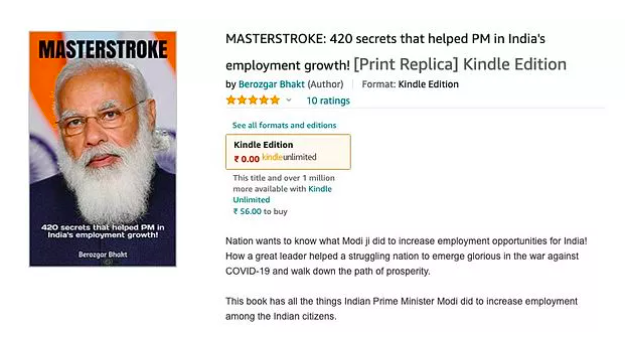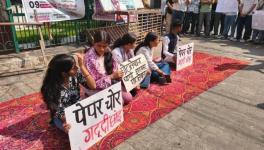Masterstroke: A 1200-Word Review of 56 Blank Pages

A rare moment of laughter during the brutal second wave of the Covid-19 pandemic was the appearance on Amazon.com of the now-famous e-book, “MASTERSTROKE: 420 secrets that helped PM in India’s employment growth!” It was launched on 23rd May and withdrawn two days later. Priced at Rs. 56, the book’s 56 pages were blank. MASTERSTROKE, in its short life of two days, drew extraordinary notices, stormed social media, and had people guffawing. We owe gratitude to the author, who took the pseudonym of Berozgar Bhakt, for injecting mirth in what are decidedly depressing days.
Yet our gratitude should not refrain us from asking: Why did the author opt for a pen name to publish a satirical e-book? Did he—it is confirmed the author is a male—or the e-commerce giant pull down the book, apprehensive of the consequences of firing seemingly blank volleys against the Prime Minister? What does it speak about the nation’s sense of humour, the state of free speech in India, and the health of its publishing industry?
To answer these questions, it is necessary to undertake a short survey of the publishing norms abroad. MASTERSTROKE falls in the genre of “empty” or “blank” books, which tell readers that the answer to the title is “Nothing.”
This genre is said to have come into existence in 1880, when a 32-page blank pamphlet, “Political achievement of the Earl of Dalkeith” was published during that year’s general election in the United Kingdom. The Earl was William Montagu Douglas Scott, who was contesting against former Prime Minister William Gladstone. The Earl lost by 211 votes.
In more recent years, the impetus to blank books came from Sheridan Simove in 2011, when he published “What every man think about apart from sex”. Priced at 4.69 pounds, its 200 pages were all blank. The book became a rage among university students who often used it to take down lecture notes. Their enthusiasm had the book take the 44th spot on Amazon’s list of bestsellers. A Spanish publishing firm, believe it or not, translated his book, flew him to Madrid for the launch, and paid him a handsome royalty. Some thought Simove was lucky, as “Everything men know about women”, also a blank book, had been on Amazon for years without triggering a wave.
Simove ran into tough luck in 2012, when he published yet another blank book, “Fifty Shades of Gray,” which sought to ride the popularity of EL James’ erotic novel, ‘Fifty Shades of Grey.’ Each page of Simove’s book turned progressively darker grey until the 200th. Random House, the publisher of EL James, served a legal notice on Simove, unimpressed that he had deliberately misspelt grey. Nor did it care that it had published Simove’s non-blank book, “Ideas Man”. Simove had to pulp his version of Fifty Shades.
Simove’s 2011 success inspired Jimmy Moncrief, an American citizen, to self-publish a 200-page blank book, “Everything Obama know about the Economy”. Moncrief had initially made 100 copies of Everything Obama, but brisk sales soon had him to produce more copies. Its popularity on Amazon had even cigar shops to stock Moncrief’s.
The advent of Donald Trump in the presidential arena in 2016 gave a real fillip to the genre of blank-book. The first to publish was Cylvia Hayes, a former Oregon first lady, who published “Surprising Reasons to Believe Trump will be a (Bigly) Great President” in November 2016, under the pen name of Dr Ann Alystiam. Her book’s 150 pages were blank, and it was available on Amazon for $10; the e-version was priced a measly $3.
Republicans were quick with their own riposte—“Reasons to Vote for Democrats: A Comprehensive Guide”, by journalist Michael J Knowles. Published in February 2017, Knowles’ book had 260 blank pages, was priced at $9.9, and its cover had a donkey painted in stars and stripes. In just a few days, the book became number one on Amazon’s bestsellers list, not least because Trump, already the President then, endorsed it with a tweet, “Ho! Ho! Ho!”
Soon, Democrats responded, with Char Daley binding 130 blank pages under the title, “Reasons to vote for Republicans: A Captivating Interpretation.”Priced at $6.95 on Amazon, it had an elephant painted in stars and stripes on the cover. The book failed to outsell Knowles’, perhaps because Democrats were too dispirited at Trump’s electoral triumph.
The above survey shows that Amazon does not hesitate to hawk blank books, even those that take swipes at leaders and political parties—or are risqué. Nor do authors of blank books shy away from using their names. Even those who opt for a pseudonym prefer to out their identity, as Hayes did.
It is perturbing, therefore, that Amazon or Berozgar Bhakt or both chose to pull down MASTERSTROKE in just two days. Perhaps the attention MATERSTROKE drew in two days unnerved them. Anonymity and silence are arguably the best protection for an Indian against state power and trolls. It is also possible the author and the e-commerce giant lost their nerve because blank pages or spaces have, over the years, acquired new meanings in India.
At least four of my friends called to say that the blank pages in MASTERSTROKE reminded them of the science experiment about the magic of invisible ink, which was taught to them in their school days. The experiment involved the following steps—take an ounce or two of lemon juice, dip a brush into it, write a message on a blank paper, and let it dry. The page turns blank. Place the paper against an electric bulb or run an iron press over it. Bingo! The message reappears. (The experiment can be viewed in this video.)
Their recall of the science experiment testifies to the paranoia prevailing in our society. This is understandable—most newspapers and books on contemporary politics have contents that do not seem worth concealing. Had MASTERSTROKE not been withdrawn, its popularity might have had people believe its 56 blank pages contained 420 secrets written in invisible ink!
Blank pages or spaces in India came to symbolise resistance during the Emergency, which then Prime Minister Indira Gandhi imposed on the midnight of June 25-26. The Indian Express had a framed blank editorial on 28th June 1975; the Hindustan Times had one on 26th June. The latter sacked its editor, BG Verghese, for showing such dare. The spunky Himmat magazine, which Rajmohan Gandhi edited, featured blank editorials in two successive issues.
Just as blank books say “Nothing” in response to their titles, blanks spaces in newspapers mourn, in silence, the diminishing of free speech. This tradition continues. In 2017, newspapers in Tripura ran blank editorial pages in response to an army officer killing journalist Sudip Datta Bhowmick. In 2019, newspapers in Jammu and Kashmir carried a blank frontpage to protest against the government’s sudden decision to deny them advertisements.
It is presumed the reader is aware of what Berozgar Bhakt is alluding to through numbers such as 420 (secrets) and 56 (pages) in MASTERSTOKE. He must be complimented for bringing, on his own, the genre of blank books to India. It is hoped his efforts will inspire the publishing industry to think of humour and free speech beyond printing joke books and “Exam Warrior”, which has been written by the Prime Minister, who appears far more adept at battling chief ministers and Opposition leaders than the virulence of SARS-CoV-2, the virus which causes Covid-19.
The author is an independent journalist. The views are personal
Get the latest reports & analysis with people's perspective on Protests, movements & deep analytical videos, discussions of the current affairs in your Telegram app. Subscribe to NewsClick's Telegram channel & get Real-Time updates on stories, as they get published on our website.
























